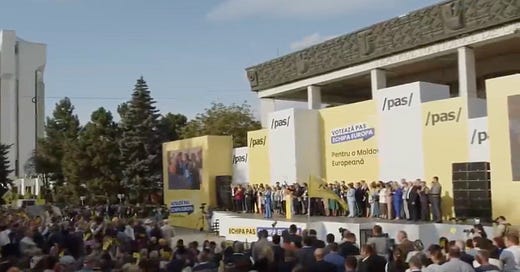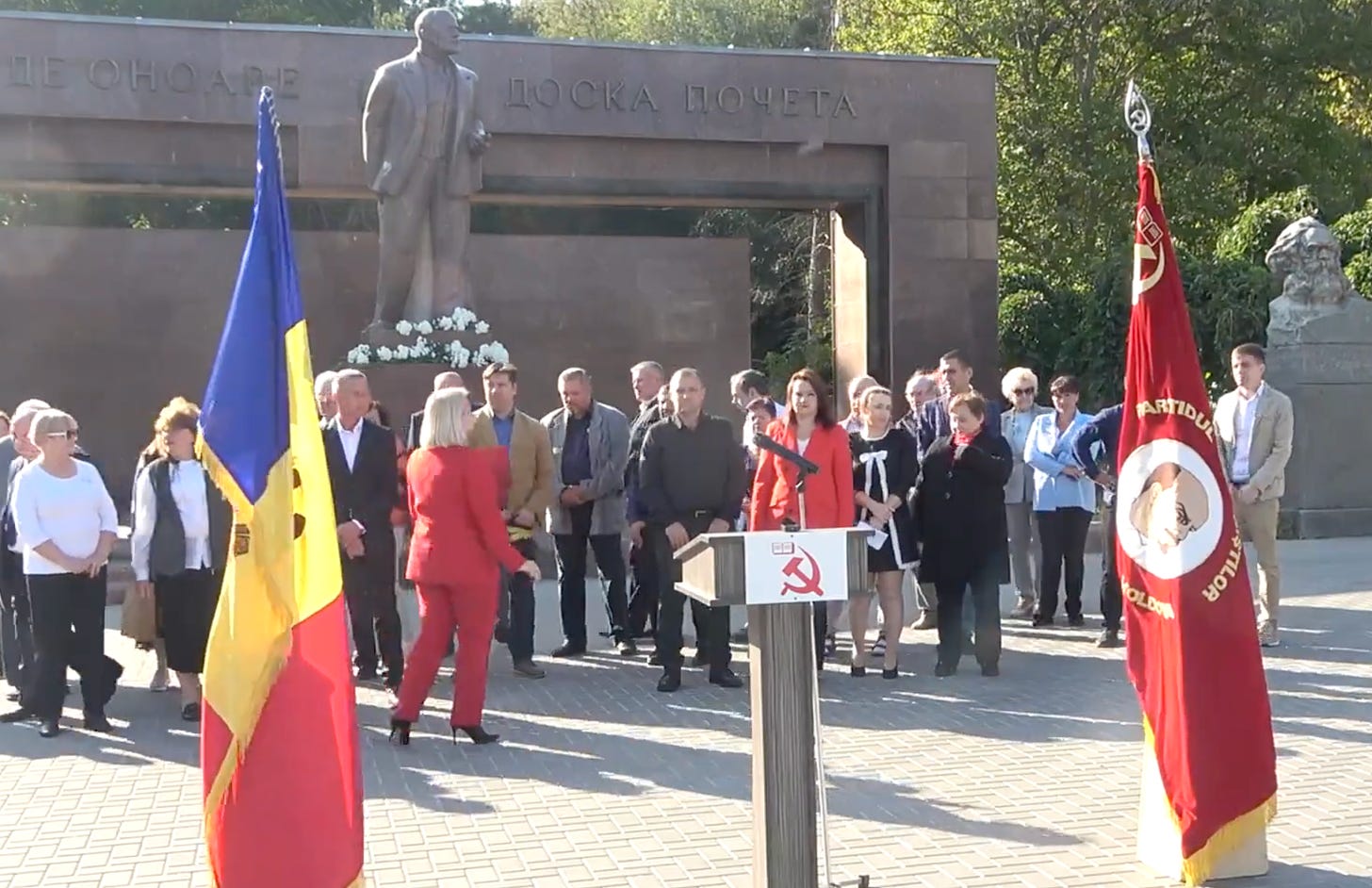Local elections are fast approaching on November 5th and Moldova has fully shifted into campaign mode. Parties have tends on street corners across cities and towns and volunteers are going door to door stuffing mailboxes with fliers. Today we’re going to look at these elections and try and get a feel as to what the stakes are and how much they matter.
It’s a few weeks to go until November 5th and a few more until mayoral runoff’s on November 19th for candidates who fail to achieve a 50% threshold in the first round. 3900 candidates are running in 898 mayoral races around the country and 56,000 candidates are running for 11,000 municipal council seats. Overall the race pits the governing Party of Action and Solidarity PAS against the Electoral Block of Communists and Socialists BECS which is primarily represented by the Socialist Party. Currently the Socialists have a majority in the councils of 17 of the 32 Raions (districts) whereas PAS only controls one. Lots of smaller parties are also competing including various reincarnations of the Shor Party such as “Chance” and “Renaissance.”
Chisinau Mayoral Elections
The biggest electoral prize in these local elections is the Chisinau mayoral race. As the leader of the capital and largest city this is the most important position being voted on next month. it is also the office offering the greatest public profile and potential to move on to higher office. 27 candidates are registered to run for mayor but recent polls suggest that there are only 3 with any real chance of victory. According to a poll by Watchdog.md released on October 13th here are the top contenders:
Ion Ceban 46.8% - Mayor Ceban is the incumbent mayor though he has temporarily stepped down from office according to new Central Election Commission CEC rules. He originally ran as a member of the Socialist Party in 2019 but has since left the party and founded his own MAN party.
Lilian Carp 14.9% - Mr. Carp is a member of the PAS Party and currently serves as a member of parliament.
Victor Chironda 4.9% - Mr. Chironda is the former vice-mayor of Chisinau under Mayor Cheban. He was forced out of office by the mayor when he opposed the demolition of the Hotel National and refused to approve what he said was a poorly construed (and possibly corrupt) construction scheme on the property. Chironda is currently running for the party “Platform DA” but is not himself a member of the party.
These polls suggest that as campaigns get underway Mayor Ceban is highly likely to win the first round of voting and, if he doesn’t win 50% outright, proceed to the 2nd round against Lilian Carp. In either case the incumbent mayor is a strong favorite to win the race.
At the same time this poll asked people which parties they would vote for in the municipal council race. Responses showed that 29.7% would vote for PAS, 13.2% the Socialists and 9.5% MAN. This clearly shows that for mayor, many voters are considering the candidate over their party of choice and that Mayor Ceban’s MAN party has far less popularity than the mayor himself.
Mayor Ceban’s strength likely derives from the public perception that he has had major successes over his first term in improving city infrastructure. In particular, work on road construction, sidewalk paving and rehabilitating parks have all proceeded at a far faster rate than his predecessors. Meanwhile, Lilian Carp is not a well known member of PAS and his time in parliament has been focused in his role on the National Security, Defense and Public Order Committee. Initially this means he has an uphill fight to introduce himself, gain name recognition and convince voters he is the best person to run the municipality.
These polls occurred at the start of the election campaign and it is possible these numbers will move as candidates introduce themselves to the electorate and make their case in the next weeks.
Opening the Campaign
Launching their campaigns the main parties attempted to gin up energy before the elections and rally their voter bases. PAS held a campaign kick-off rally in front of the National Opera where they promised to “end populism in the city,” tackle problems such as traffic jams, and invest in infrastructure improvements.
The Socialists launched their campaign in Valea Morilor park and promised to end the rule of “Soros and NGOs” in Moldova. They also promised a ring road, lower taxes, 100 kindergartens and 400 playgrounds.
Meanwhile, the Communists launched their campaign in front of a statue of Lenin with the slogan "it was better under the communists, it will be better under the communists.” Their campaign pitch relied largely on Soviet Nostalgia and promises to return the heavy industry lost after the Soviet collapse.
Various smaller parties attempted to break through with their own messaging, with one notable example being CUB Party candidate Ion Bulgac. Mr. Bulgac is 23 years old and has promised to create the largest electronic music festival in Eastern Europe if he is elected.
To his credit, at least his message broke through. Or at least he tried. News outlet Newsmaker did a rundown of all the candidates and had trouble even finding out who some where. For example, Alla Popova of the “Patriots of Moldova” Party filed a wealth declaration showing a yearly income of 30,000 Transnistrian Rubles, no cars, no house and no property registered in her name. Newsmaker tried to find a photo of her and did not succeed even after making requests to her party.
Public Priorities in Chisinau
What is notable about the various public messaging campaigns for mayor is that few directly address the issues voters say are most pressing. In the same Watchdog.md poll cited above, voters ranked their top priorities as follows:
56.3% reducing traffic
36.6% repairing broken roads
32.5% lack of parking spaces
17% illegal construction
12.6% improving public transport
Traffic and lack of parking are becoming a very acute problem in Chisinau. No mayor since 2007 has approved a general development plan for the city. Such a plan would set out general infrastructure targets, forecasts on the growth of car ownership and zoning development plans. In the last 2 years alone, the number of cars on Chisinau streets increased from 316,800 to 348,600. Mayor Ceban should be particularly vulnerable on this point as he has not implemented any plans to increase parking spaces, introduce paid parking or otherwise combat congestion. At the same time, no other candidates have announced plans either.
Analysis - how important are local elections?
In this article we’ve spent the majority of our time looking at the Chisinau mayor’s race since this is the single most important election being held next month. The stakes are high in the mayoral election for all parties. Mayor Ceban needs to win a second term to maintain political relevance and potentially set himself up for a run for president. PAS wants to beat Ceban, in part to check this ambition and in part for the political prestige that comes with running the country’s biggest city. The Socialists want a good showing to try and slow their party’s slide into political irrelevance.
All of this political maneuvering somewhat hides what is really going on though. The same Watchdog.md poll found that among voters that support Ceban for mayor by 46.8%, only around 9% would vote for him for president. That poll only reflects Chisinau voters, but with the MAN Party not running candidates in any other part of the country it is hard to imagine Mayor Ceban has much hidden support elsewhere.
Another meta-narrative about the election is that it should be seen as a national vote of confidence in the PAS government. In some sense this is fair. PAS and the Socialists are the only parties really competing nationally in this election and gains by either party would show support or disaffection amongst the electorate… to a degree.
In reality, local elections are very local affairs in Moldova. People in small towns often know their mayors. They know who is corrupt and who isn’t. They know who succeeded in paving their roads and who sat on their hands all term. Mayor’s jobs can be hyper-local in a way that would make an excellent sitcom. Many spend their days responding to complaints about lightbulbs that are out at the school, or helping residents deal with escaped animals. Furthermore, mayors change parties fairly frequently. For many years there was the perception that if a mayor aligned their party with the party in national power that would result in more funds or infrastructure projects in their towns. All this is to say that fundamentally these 898 mayoral elections and 11,000 town council seats are about the issues of these towns and cities. They are also strongly driven by the personalities and people running in the elections in a way that national parliamentary elections are not.
If PAS does very well in local elections it will show strong party organization across the country. If the Socialists do well it will similarly show that they have maintained a base of support and can still hold together politically. If the “Shor” Parties do well it will open up more regions for Shor’s populist politics and spending to gain ground. These elections matter. They matter for countless local communities and they matter to some degree as indicators of national politics. But they are not necessarily a major indicator of what a future parliamentary election would look like. As the campaign develops, and as we eventually get results, we should look at the news with a nuanced lens and never forget that in elections like these politics is a very local business.






Thanks for such a detailed reply.
It does sound like:
* People actually get out and vote
* They know about the candidates
In my personal view several major western democracies have now reached the point where many would vote for an incompetent from the party they feel loyalty to, over someone competent from another party. I'm not a fan of rigid party loyalty as you may have gathered!
This sounds a LOT healthier than the UK. Do you happen to know typical turnout?
In the UK it's typically really low:
https://lginform.local.gov.uk/reports/lgastandard?mod-metric=3361&mod-area=E92000001&mod-group=AllLaInRegion_WestMidlands&mod-type=namedComparisonGrou
(25.9% shown on that link!)
And most who vote tend to do so on the basis of the national parties.